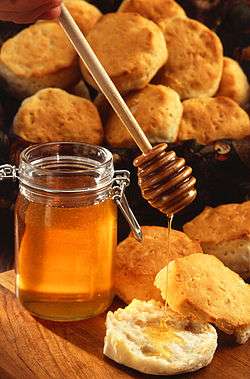Definify.com
Webster 1913 Edition
Honey
Hon′ey
(hŭn′y̆)
, Noun.
[OE.
honi
, huni
, AS. hunig
; akin to OS. honeg
, D. & G. honig
, OHG. honag
, honang
, Icel. hunang
, Sw. håning
, Dan. honning
, cf. Gr. κόνισ
dust, Skr. kaṇa
grain.] 1.
A sweet viscid fluid, esp. that collected by bees from flowers of plants, and deposited in the cells of the honeycomb.
2.
That which is sweet or pleasant, like honey.
The
honey
of his language. Shakespeare
3.
Sweet one; – a term of endearment.
Chaucer.
Honey
, you shall be well desired in Cyprus. Shakespeare
☞ Honey is often used adjectively or as the first part of compound; as, honeydew or honey dew; honey guide or honeyguide; honey locust or honey-locust.
Honey ant
(Zool.)
, a small ant (
– Myrmecocystus melliger
), found in the Southwestern United States, and in Mexico, living in subterranean formicares. There are larger and smaller ordinary workers, and others, which serve as receptacles or cells for the storage of honey, their abdomens becoming distended to the size of a currant. These, in times of scarcity, regurgitate the honey and feed the rest. Honey badger
(Zool.)
, the ratel.
– Honey bear
. (Zool.)
See
– Kinkajou
. Honey buzzard
(Zool.)
, a bird related to the kites, of the genus
– Pernis
. The European species is Pernis apivorus
; the Indian or crested honey buzzard is Pernis ptilorhyncha
. They feed upon honey and the larvæ of bees. Called also bee hawk
, bee kite
. Honey guide
(Zool.)
, one of several species of small birds of the family
– Indicatoridæ
, inhabiting Africa and the East Indies. They have the habit of leading persons to the nests to wild bees. Called also honeybird
, and indicator
. Honey harvest
, the gathering of honey from hives, or the honey which is gathered.
Dryden.
– Honey kite
. (Zool.)
See
– Honey buzzard
(above). Honey locust
(Bot.)
, a North American tree (
– Gleditschia triacanthos
), armed with thorns, and having long pods with a sweet pulp between the seeds. Honey month
. Same as
– Honeymoon
. Honey weasel
(Zool.)
, the ratel.
Hon′ey
,Verb.
I.
[
imp. & p. p.
Honeyed
; p. pr. & vb. n.
Honeying
.] To be gentle, agreeable, or coaxing; to talk fondly; to use endearments; also, to be or become obsequiously courteous or complimentary; to fawn.
“Honeying and making love.” Shak.
Rough to common men,
But
But
honey
at the whisper of a lord. Tennyson.
Hon′ey
,Verb.
T.
To make agreeable; to cover or sweeten with, or as with, honey.
Canst thou not
honey
me with fluent speech? Marston.
Webster 1828 Edition
Honey
HON'EY
,Noun.
1.
A sweet vegetable juice, collected by bees from the flowers of plants, and deposited in cells of the comb in hives. Honey, when pure, is of a moderate consistence, of a whitish color,tinged with yellow,sweet to the taste, of an agreeable smell, soluble in water, and becoming vinous by fermentation. In medicine, it is useful as a detergent and aperient. It is supposed to consist of sugar, mucilage, and an acid.2.
Sweetness; lusciousness. The king hath found
Matter against him, that forever mars
The honey of his language.
3.
A word of tenderness; sweetness; sweet one.HON'EY
,Verb.
T.
1.
To sweeten.Definition 2026
honey
honey
English

A jar of honey, with a honey dipper and scones
Adjective
honey (comparative more honey, superlative most honey)
- Describing a thing involving or resembling honey.
- 1599 William Shakespeare, Henry V, act 1, scene 2:
- So work the honey-bees, / Creatures that by a rule in nature teach / The act of order to a peopled kingdom.
- 1599 William Shakespeare, Henry V, act 1, scene 2:
- A spectrum of pale yellow to brownish-yellow colour, like that of most types of honey.
Translations
involving or resembling honey
|
honey-colored
|
|
Noun
honey (usually uncountable, plural honeys)
- (uncountable) A viscous, sweet fluid produced from plant nectar by bees. Often used to sweeten tea or to spread on baked goods.
- (countable) A variety of this substance.
- (figuratively) Something sweet or desirable.
- 1595, William Shakespeare, Romeo and Juliet, Act 5, Scene 3, lines 91–93:
- O my love, my wife! / Death, that hath suck'd the honey of thy breath / Hath had no power yet upon thy beauty.
- (Can we date this quote?) Shakespeare
- the honey of his language
- 1595, William Shakespeare, Romeo and Juliet, Act 5, Scene 3, lines 91–93:
- A term of affection.
- Honey, would you take out the trash?
- Honey, I'm home.
- (countable, informal) A woman, especially an attractive one.
- Man, there are some fine honeys here tonight!
- A spectrum of pale yellow to brownish-yellow colour, like that of most types of (the sweet substance) honey.
-
honey colour:
-
Synonyms
Hypernyms
Hyponyms
Hyponyms of honey (noun)
|
|
|
Translations
sweet substance produced by bees
|
|
variety of honey
|
term of affection
|
|
colour
Verb
honey (third-person singular simple present honeys, present participle honeying, simple past and past participle honeyed)
- To be gentle, agreeable, or coaxing; to talk fondly; to use endearments.
- Shakespeare
- Honeying and making love.
- Shakespeare
- To be or become obsequiously courteous or complimentary; to fawn.
- Tennyson
- Rough to common men, / But honey at the whisper of a lord.
- Tennyson
Derived terms
Derived terms
Related terms
Related terms
|
|
|
See also
- Appendix:Colors
other entries of interest